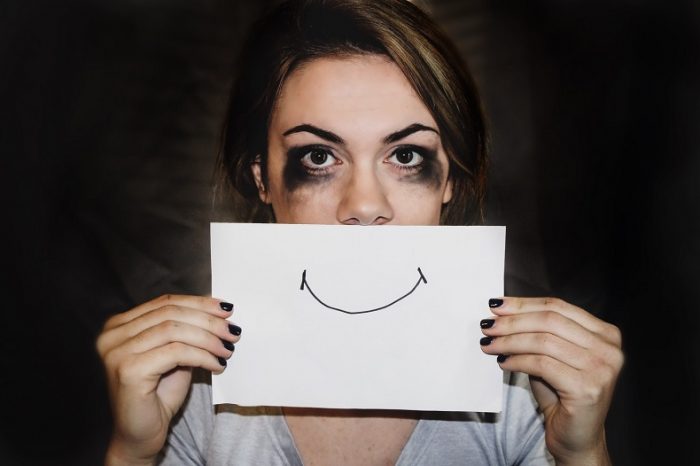It’s 5:30 p.m. on a Thursday.
The feeling comes out of nowhere—unwelcome, and yet so familiar. “Oh, you again,” I think to myself.
It is always the same—although it comes at random times and without any warning. The back of my throat closes off and a vaguely metallic taste starts on the back of my tongue. My chest feels heavy—constricted—like someone or something is pushing down on me, but the heaviness comes from inside.
I bring my thoughts to the sensation of heaviness and realize I am not breathing. “In through the nose, out through the mouth…” This mantra rumbles inside my head. My breathing starts to regulate, but the feeling doesn’t leave. It has claimed its place. It is a part of me—so much that when it is not present, something feels off.
So, what’s the matter?
How do I explain to you that which I do not know? The feeling has a mind of its own, and it knows before I do. I start to prepare myself for the questions by thinking of suitable responses: I am worried about my kids, I am worried about money, I feel overwhelmed by work. Anything is better than the truth. I don’t really know…I just know it is there to remind me that I don’t have it together.
I am not good enough.
I hear those words in my head on repeat. Anything can go into the “not good enough column” in my head: it is a constant checklist of errors and judgements—a deep well of sour notes from which to draw my own self-criticism.
I try to close my eyes and keep breathing. The feeling bleeds through at the edges like deep red watercolor moving across the paper—slowly, moving almost like tributaries of a great river. “You are enough,” it says on my wrist. I wear it as a reminder that I am more than this feeling. I remind myself of self-care and compassion. Underneath the weight of the feeling, the words are hollow and have no influence. My chest is heavier—like drowning without being underwater.
This is when “self-care” used to mean a glass of wine—or three. Anything to make it stop. The tears start to well up behind my eyes. My nose crinkles up, and my face tries to fight the tears spilling out and running down my face. “It’s crazy to cry right now,” I say almost out loud. I don’t even know what is bothering me. “What is wrong with you?” I say to myself. “Why can’t you be like normal people?” Add more points to the “not good enough” column. The tears roll down my cheeks, and my nose starts to run. Shuddering breaths sob from my chest.
I wipe my face. I drink some water. I smile and say nothing is wrong. I can’t say “I’m having an anxiety attack,” because you will feel like you have done something wrong, and that will make everything worse. “How was your day?” I ask trying to change the subject.
It is time to start dinner, and there is no time to write in my journal—to dig deeper into the feeling and figure it out. I push it down and do what needs to be done. That’s what it means to be strong, right? Just push through and get the work done. Work harder so no one can see the cracks underneath the surface. Ignore it and it will go away. Just be better.
I carry the weight with me: it’s heavier than before, and yet I keep moving forward. I am moving in slow motion. Can everyone see how I move under the weight of this? The fear adds to the feeling, and I try to wish it away. It has taken up permanent residence now—there is nothing that can persuade it to leave. I think about taking a pill, but as soon as I do that, I know you will think there is something definitely wrong with me—that I must be crazy.
I will just pretend. I will pretend I am like everyone else—like someone on TV, smiling and happy, with nothing to worry about. Someone who doesn’t feel this way at 5:30 p.m. on a Thursday.
Over 40-million American adults suffer from anxiety (according to the American Depression and Anxiety Association), and the estimate is that only about 39 percent of adults get medical attention. Anxiety is a real medical condition, as real as heart disease or diabetes. Yet, the stigma and shame of not being able to “push through it” prevents many adults from seeking treatment.
Anxiety is irrational. It doesn’t make sense or follow a linear train of thought. If you are in a relationship with someone who is struggling with anxiety, you may feel like you are “walking on eggshells” or you have become your partner’s “personal punching bag.” You may have actually said out loud, “What the f*ck is wrong with you anyway?”—which may have spiraled your partner deeper into anxiety or depression. You may be thinking that this is all just a manipulation: that your partner should just “suck it up,” instead of making such a big deal out of something that she (or he) should be able to handle.
For people who live with anxiety (or a combination of anxiety and depression), managing the symptoms can be overwhelming. Developing a routine of strategies and support systems that work for you is important. Different strategies for moving through the worst parts of the anxiety or panic attack work for different people, so having a variety of personal strategies is important. I have struggled with anxiety on and off for 30 years (god, I’m old), and I have developed a few things that work for me.
At different points in my life, I have had to use medication and therapy to get through significant episodes of anxiety—but most often, these methods are a good starting point:
Breathe. Seems obvious, but it isn’t. I have used different mantras, but the simplest one for me is just “breathe in, breathe out” and to consciously breathe in through my nose and out through my mouth. Sometimes, with kids, I tell them to: “Breathe in the purple air, and breathe out the yellow air.” So they can add a component of visualization to the breathing.
Move. Get up. Walk. Go for a run. Do yoga. Get on the spin bike. Get your body moving as a way to literally move through the anxiety.
Do something you love. I love to bake. I also love cookies. Baking can be a great way for me to move through anxiety. The negative side effect is that I need to lose 10 pounds.
Get grounded. Talk to a friend. Read a book with your kids. Bring yourself into the world of now, instead of the confabulations that you might have in your head.
Write. Use a journal or a blog to get your thoughts down on paper. There is something about writing that helps to take the scary out of the thoughts inside our head. Writing helps us to process and think through our feelings, which can make them seem more rational and coherent—perhaps even ready for other humans to hear.
Reach out. When I first started having anxiety, I literally thought I was going crazy. I thought I was the only person who felt like this. Talking with people about your anxiety helps to normalize it and make it less in charge. Reaching out to others who understand your struggle can help with the most difficult moments. And always reach out if you are feeling overwhelmed or scared by your own thoughts or feelings. Reaching out is not weakness: it is strength to know that you are not the only link in your chain.
Laugh. It seems like this might be avoiding the problem, but sometimes a good laugh can just help put things enough in perspective that you can move through the irrational thoughts and physical feelings of the anxiety.
Anxiety is real. It is an illness that can be treated. Understanding your own symptoms—or those of someone you love—can help break the silence and the stigma of anxiety in our daily lives. If you relate to my struggle, I urge you to talk with your doctor or a mental health professional. There is no need to ever suffer in silence if you struggle with anxiety.
No matter what time it is.
~









Read 1 comment and reply